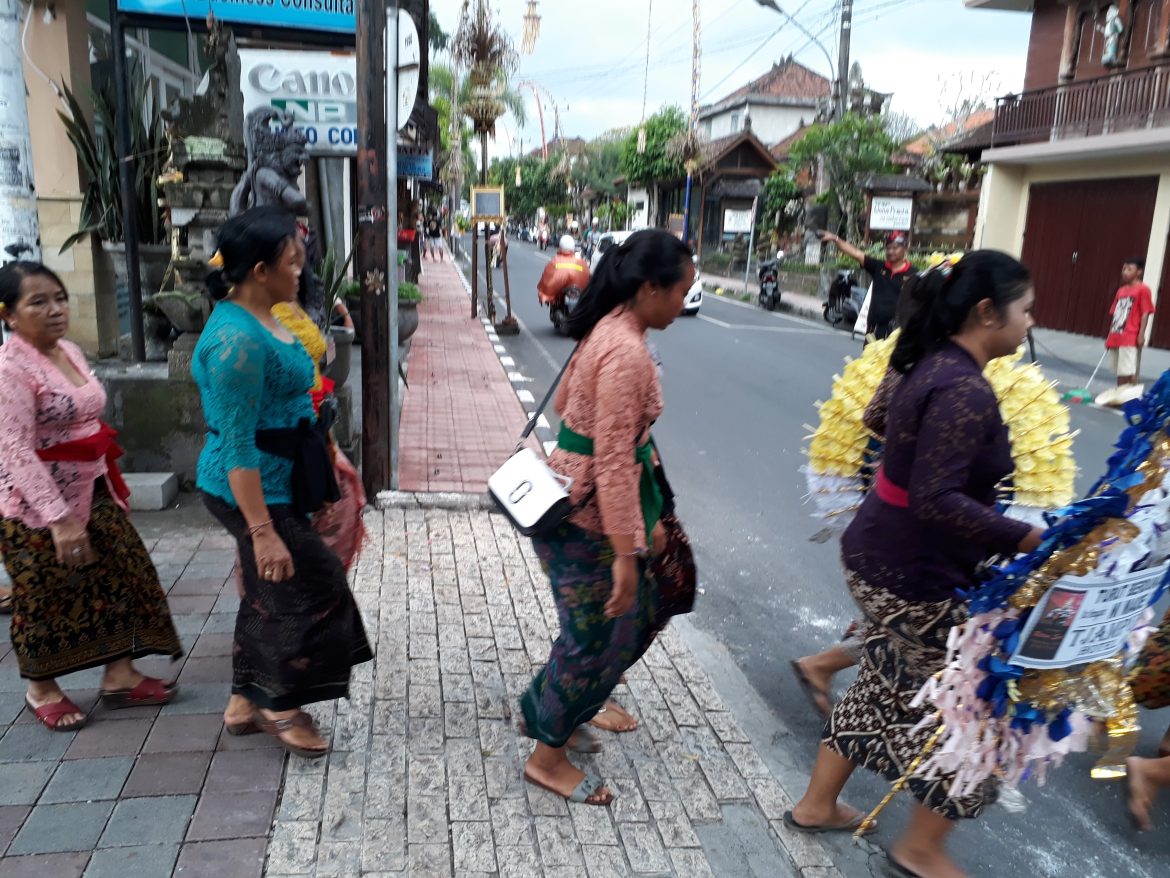Gina Zanolini Morrison, professor of global cultures, plans to retire in August of 2025, but shows no signs of slowing down her academic pursuits. Instead, she’s using her Fulbright Scholar award to put a different spin on her research in hopes of reaching new audiences with her play, The Women of Nusantara: Their Seen and Unseen Worlds.
Nusantara is an ancient word for the multinational region in Southeast Asia which includes Malaysia, Bali and Borneo. Morrison is familiar with the Malay Archipelago as it’s the homeland of her husband, William. Since the couple met in a coffee shop more than 30 years ago, they’ve visited Malaysia numerous times, often with their daughter, Victoria. “I immediately fell in love with his family and the culture, architecture and art forms,” says Morrison. “I’ve always been a big fan of Malaysia. They have their problems, but they handle diversity well. I always thought Malaysia had a lot to teach us.”
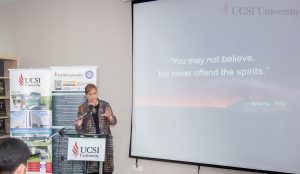
She’s also traveled to the area for both student and professional development. Morrison has taken students to Malaysia on six separate occasions. Following one seven-week program, four students returned to teach in the country. Last year, her daughter spent a year in a Kuala Lumpur international school teaching English to middle school students.
Morrison also spent years doing academic research in Malaysia and Southeast Asia. From 2016 through 2018, she conducted interviews with 70 working women including bartenders, bankers, entrepreneurs, CEOs and teachers. The discussions focused on the juxtaposition of the modern world with traditional spirituality. Though the women were diverse in terms of ethnicity, age, education, religion and career choice, they shared a common belief in the mystical. “These women have one foot in the modern world and one foot in the traditional world,” says Morrison. “People were so eager to help me understand the phenomenon. They talked about it openly. They told me such stories.”
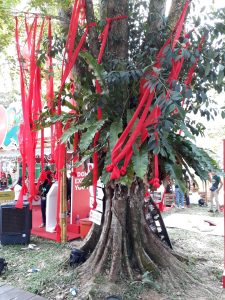
Morrison recalls one story of a woman who’s an entrepreneur. She hired workers to clear a tract of land for development. During the project, the equipment would stop for no apparent reason. Before proceeding any further, they conducted a cleansing of the property, offered prayers to honor the ancestors and shared a meal. After paying proper respects, the project was able to continue, though they left one tree standing as an exit for the spirits. “That’s an important tree,” says Morrison.
Based on these interviews, after years of working with a student team to compile data, Morrison published two papers dealing with the role of spiritual practices in cultural sustainability and one on economic development. The women pursued day-to-day activities involving work and family, but also engaged with dreams, visions, trances and signs that advised caution or shared messages of comfort and reassurance. They then applied these mystical elements for the benefit of their homes and communities. “They have this strong belief that there’s so much more to life than what we see in front of us. There’s another layer there,” says Morrison. “They have a little help with what they do.”
Though she was thrilled with the publications, Morrison wanted to share these tales beyond academic journals, and thought she could use a little help, too. Inspired by decades of theater experience and the drama The Laramie Project by Moisés Kaufman and the Tectonic Theater Project, Morrison planned to adapt the interviews into a stage play. Except, she had never written a play before. After speaking with David Hicks, director of Wilkes University’s Maslow Family Graduate Program in Creative Writing, Morrison enrolled in the low-residency program’s playwriting track.
After years of writing academic papers and articles, Morrison struggled a bit with playwriting. “All this time, I was trying to say the exact right thing,” she says. Gregory Fletcher, a creative writing faculty member who taught Morrison’s playwriting foundations course, advised her to move the plot along to keep people in their seats.
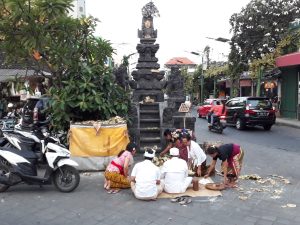
Fletcher also advised her to work with Juanita Rockwell, a playwriting faculty member whose work tends toward the musical and the experimental. “We hit it off immediately,” says Morrison. Rockwell has been able to help her shape the play, which begins with an acknowledgement of the original people of the land and features cultural dances between scenes.
“It became immediately clear to me that traditional western narrative structure wouldn’t make sense for her project. In addition, she is creating the work as a performance in Malaysia for Malaysians, first and foremost,” says Rockwell. “Yet, some of the best contemporary western theater, film, fiction and non-fiction have already broken most of the old rules of narrative structure, so there’s no reason a work like Gina’s couldn’t also be received well in the U.S.”
The women Morrison interviewed wanted to shine a light on their lives, which combine modern, multicultural elements with those deeply rooted in cultural tradition. Using elements familiar to audiences, like a child receiving the story, helps to make the mystical tales relatable. “I’ve always tried to present these beliefs as a beautiful thing, not a strange thing,” says Morrison. I didn’t want to otherize them. They’re not backwards. They’re working women, just like me, worried about their kids and their bills and what’s for dinner.”
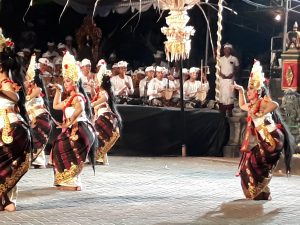
With the creative process underway, Morrison applied for a Fulbright Scholar grant. “Fulbright has many programs, but this is the one people typically think about when they think about Fulbright,” she says. Though she received two previous Fulbright Specialist awards — one in 2018 for professional development at a small university in Malaysia and one in 2022 for diversity programming at a small women’s college in India — this is her first scholar grant. Morrison was traveling in Malaysia when she found out she received the Fulbright award.
“It’s really a highlight of my career. I see it as a destiny,” Morrison says. I feel like all my experiences have been pointing me toward this.”
Morrison continues her creative work on The Women of Nusantara: Their Seen and Unseen Worlds, preparing to travel to Malaysia in January 2025. She’ll work at UCSI University in Kuala Lumpur, Malaysia, where her play will have its world premiere at an international women’s conference in May 2025, before possible performances at other regional venues.
As luck would have it, her trip falls between the two creative writing residencies in January and June, and before her scheduled retirement in August. “It’s a way of wrapping up my career. It’s a really nice way for me to exit,” says Morrison. “Wilkes has been so supportive. The stars really lined up for me.”
